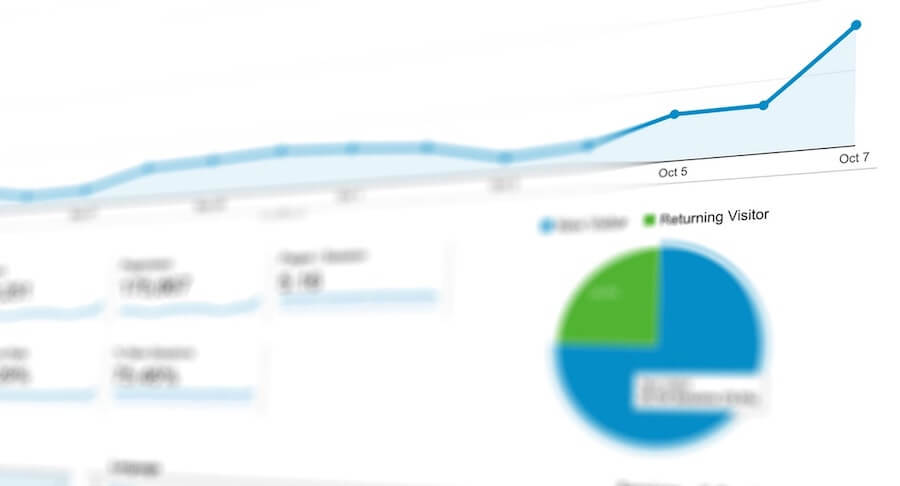
Let’s start with the basics: KPI stands for Key Performance Indicator. It’s incredibly important to identify your SEO KPIs as you start on your SEO campaign. You need to be able to measure progress in your campaign to see if you efforts are returning any value. Specific KPIs are going to differ, but there are major ones your should be reporting on and using to measure your SEO campaign.
You want to be SMART about about your KPIs (I know cheesy, but stick with me). By this I mean you want to pick SEO metrics that are:
- Specific
- Measurable
- Achievable
- Results-based
- Time bound
Here are SEO KPIs that you should be tracking that work across almost any business and website and stick to the SMART protocol.
Organic Traffic

This is an easy one. Is your organic traffic increasing on a monthly basis? Also, make sure you are looking at organic traffic in the specific region you are serving, if that matters to your business or website. If you only do business in Texas, then you’re going to want to look at how your organic traffic is performing in Texas. If your organic traffic is soaring in New York, but is tanking in Texas, you need to be aware of it and act on that.
In order to set up a KPI for organic traffic you need to decide what is a reasonable expectation of organic growth. If you’re starting at zero organic sessions, it’s not reasonable to expect to achieve 10,000 organic sessions in a month. Also, if you’re working in a really competitive market that can impact how quickly you will see results.
I would love to suggest a number at what you should be hitting, but it’s going to be radically different across industries and regions. You should analyze how competitors in your industry are doing through tools like SimilarWeb or SEMrush so you can get an idea of the organic traffic they are pulling in and what you can aspire to. Just remember that it takes time to see progress. Even Google says it can take 4 to 12 months to see the results of your SEO work.
User engagement metrics

To make sure your website is engaging its users, you are going to want to look into the following SEO metrics.
Bounce rate
This is how Google defines a bounce:
In Analytics, a bounce is calculated specifically as a session that triggers only a single request to the Analytics server, such as when a user opens a single page on your site and then exits without triggering any other requests to the Analytics server during that session.
This is pretty simple, and if your website has a high bounce rate you need to take a look at your website and the content you are presenting. Is it taking too long for the website to load? Is the content taking too long to get to the point? Is the content not web friendly? For a point of reference, a bounce rate of 41-55% is considered average.
Also, if all of a sudden your bounce rate is sub-20% that’s cause for alarm too. It means your analytics set up is probably messed up.
To set an SEO KPI for the bounce rate, you can use the web average as something to try and achieve, but is also just a good metric to keep an eye on to make sure nothing is going wonky or there are sudden drops or spikes.
Average session duration
This is another metric to keep an eye on as a KPI. Obviously, if you’re writing long form content for your website and your average session duration is 2 seconds you’ve got to take a look at what is happening when users are encountering your content.
Dive deeper into this metric and see how it differs depending on your channel. If your average session duration is much higher for the organic channel versus social, you need to look at how you are presenting your content on social. You can dive even deeper and see if there are particular social channels that are hurting or helping your average session duration.
Leads and Conversions

Tracking the amount of leads your organic traffic is bringing in is incredibly important to show the ROI your SEO campaign. How leads and conversions are tracked can differ from website to website. For some websites, it’s as easy as tracking how many people are filling out a form on your website and setting up a goal for that in Google Analytics.
Cost per lead
While you need to be tracking leads to your website, you should be also be aware of how much a lead is costing you. If you’re spending a significant amount of money on your SEO campaign, and a sale comes through that only nets you $50 through your SEO efforts, you need to take a look at your efforts. Some things to consider if cost per leads spikes:
- Is there something wrong with tracking?
- Did your ecommerce platform make changes that are hurting conversion?
- Is another channel brining in a more conversions?
Links

Link building is an important part of any SEO campaign, so you should be keeping a watchful eye on your backlink profiles. I’m a huge proponent of Ahrefs as a tool to track incoming links, but it’s also a useful way to track any links you may have lost.
When reporting on links as an SEO KPI, you want to make sure you’re getting high quality and/or relevant backlinks to your website. If you’re working on a local website, you should be focusing on getting links from local websites as well, which you can target through joining Chambers of Commerces or engaging in local sponsorships like sponsoring a Little League team.
Also, if you’re noticing a sudden spike of unnatural or spammy backlinks you will want to make sure that your SEO specialist is not actively building those links to your website. And if your SEO Specialist won’t tell you where they are building links, you should fire them, or at the very least have a very serious talk about transparency with their work.
Overall with link building as a KPI, you want to see a gradual uptick in referring domains over time. Any sudden drops or spikes from spammy websites are cause for concern.
Keyword rankings
I have a love-hate relationship with tracking rankings. I often think people who are not as familiar with SEO put too much emphasis on keyword rankings as an SEO KPI and don’t look at the bigger picture. If you have a business that offers a product nationwide, you can track keywords on a national level but know that local SERPs can put keywords in radically different locations across the country.
If you’re a local business it’s a lot easier to track keywords for the zip codes or cities you want to service customers in. There are a couple of great tools you can use to track keywords like Stat or Authority Labs. But even if you are tracking keywords on a local level, SERPs can still be slightly personalized to individual users. Also, SERPs are different on mobile vs. desktop, so you want to make sure you are tracking your keywords on both.
So with my qualms about keyword rankings out there, I think it’s valuable to track them to make sure you are seeing progress. Like link building, most progress on keywords is going to be a slow, but steady process and is worthwhile of being an SEO KPI for your campaign.
Need help with your SEO KPIs?
I’ve been working in SEO for over 10 years, and would be happy to talk with you about your SEO project. I offer different SEO services and packages. Please contact me for more information and how I can help you start seeing results.